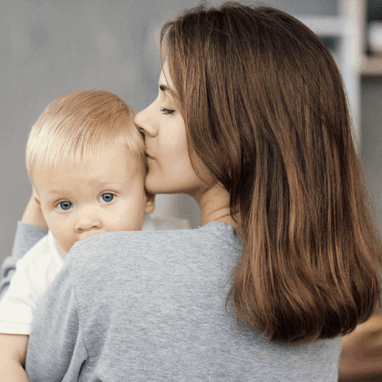Whooping cough is a highly contagious bacterial infection and can affect people of all ages. It can cause serious disease in babies and complications in older adults.
Did you know?
- In Australia, whooping cough outbreaks occur every three to four years.1
- Infants less than 6 months of age are at greatest risk of serious disease and death due to whooping cough.
- Family members are an important source of infection and have been linked to just over half of infant whooping cough cases.1
- In adults, whooping cough can cause ongoing problems such as a prolonged cough (100-day cough) and sleep disturbance.
- Up to 1 in 10 diagnosed cases in older adults end up in hospital.2

What is it?
Whooping cough, also known as pertussis, is a highly contagious respiratory infection caused by the bacterium Bordetella pertussis.
It causes repeated attacks of violent coughing which may be followed by the classic ‘whoop’ noise when trying to breath in.
Complications can include pneumonia, seizures, brain damage and, in rare cases, death. In older adults, whooping cough can lead to pneumonia, rib fractures and fainting, and can increase the severity of asthma and chronic obstructive airways disease.
Pertussis occurs in all countries, including developed countries that have high rates of immunisation.
What are the symptoms?
The symptoms of whooping cough generally occur between 7 to 20 days after infection and can last for up to three months.
Early symptoms are similar to a cold. The mild, irritating cough gradually develops into repeated bouts of violent coughing which are typically (but not always) followed by a 'whoop' sound when breathing in.
Other symptoms may include:
- vomiting
- fainting
- exhaustion from sleep disturbance
- poor appetite
- dehydration
This is not a full list of symptoms. Please speak to a healthcare professional if you have any concerns about whooping cough.
How is it spread?
Whooping cough is highly contagious and can be passed on to others for up to three weeks after symptoms first show.
It spreads from person to person through the air, such as when an infected person coughs or sneezes; and also, through direct contact with fluid from the nose or throat of an infected person.
An infected person is most infectious in the early stages of illness. Unfortunately, this is also when the symptoms are more cold-like and less specific to whooping cough – which means that adults, adolescents and siblings can unknowingly spread the disease to babies, young children and older adults.
Who is at risk?
Whooping cough can affect people of all ages. Immunity to whooping cough after infection or immunisation decreases over time (this is called waning immunity), which in turn increases your risk of infection.
Those most at risk include:
- infants less than 6 months of age, who are more likely to develop severe disease and complications
- adults aged 65 years and older, who are at greater risk of complications resulting in hospitalisation when compared to younger adults
- adults who have not received a whooping cough booster in the last 10 years
Other people may be at risk of whooping cough. Please discuss your individual circumstances with a healthcare professional.
Discover tips to help strengthen immune system function and keep you feeling your best as you age. Talk to your doctor about ways to maintain a healthy immune system and embrace healthy ageing
PM-AU-AVX-WCNT-190052 Date of GSK Approval: January 2021

